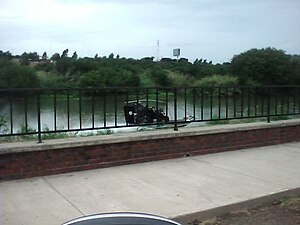This article needs to be updated. (November 2022) |
| Piracy on Falcon Lake | |||||||
|---|---|---|---|---|---|---|---|
| Part of the Mexican drug war | |||||||
 United States Coast Guardsmen patrolling Falcon Lake, October 2010. | |||||||
| |||||||
| Belligerents | |||||||
|
| Los Zetas | ||||||
| Commanders and leaders | |||||||
| Unknown | Unknown | ||||||
| Casualties and losses | |||||||
|
Mexico: 1 soldier killed and 1 investigator killed | 12 killed | ||||||
| Civilian casualties: 1 killed | |||||||
Piracy on Falcon Lake refers to an increase in crime at the border between the United States and Mexico on Falcon Lake. The lake is a 60-mile (97 km) long reservoir of the Rio Grande that was constructed in 1954 and is a known drug smuggling route.[1]
A turf war between rival drug cartels for control of the lake began in March 2010 and has led to a series of armed robberies and shooting incidents. All of the attacks were credited to the Los Zetas cartel and occurred primarily on the Mexican side of the reservoir but within sight of the Texas coast. The so-called pirates operate "fleets" of small boats designed to seize fishermen and smuggle drugs.[2][3]
While the events have been referred to colloquially as piracy, all the waters of Falcon Lake are considered either US or Mexican territorial waters and therefore crime there is not technically piracy under Article 101 of the UN Convention on the Law of the Sea.[4]
- ^ "Conspiracy theories linger in Falcon Lake Mexican 'pirates' shooting", The Christian Science Monitor[permanent dead link].
- ^ Drug Wars in Tamaulipas: Cartels vs. Zetas vs. Military, Mexi data, archived from the original on 2010-04-14, retrieved 2010-11-11.
- ^ "Mexican pirates attack Texas fishermen on Falcon Lake, which straddles border", The Washington Post, May 29, 2010.
- ^ "SECTION 4. CONTIGUOUS ZONE, Article 33". UNCLOS PART VII – GENERAL PROVISIONS. United Nations. Retrieved 2014-11-17.